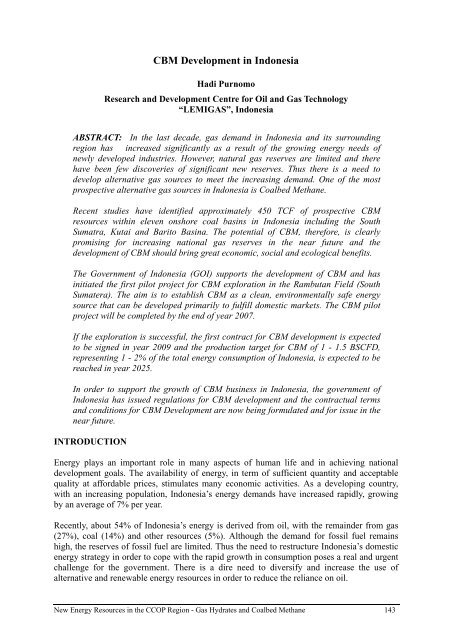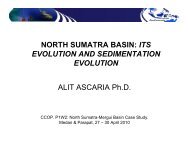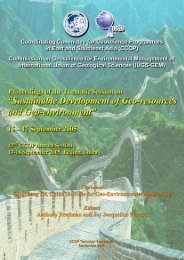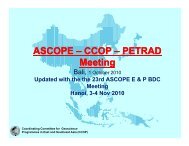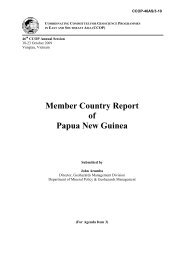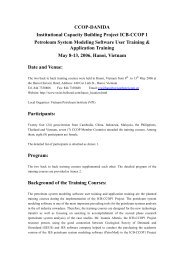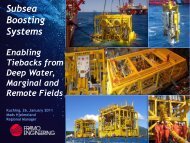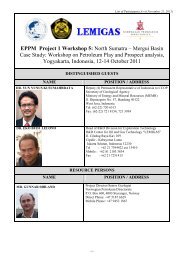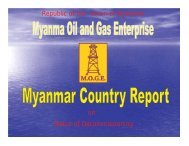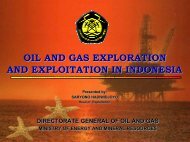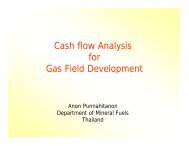Create successful ePaper yourself
Turn your PDF publications into a flip-book with our unique Google optimized e-Paper software.
CBM Development in Indonesia<br />
Hadi Purnomo<br />
Research and Development Centre for Oil and Gas Technology<br />
“LEMIGAS”, Indonesia<br />
ABSTRACT: In the last decade, <strong>gas</strong> demand in Indonesia and its surrounding<br />
region has increased significantly as a result of the growing energy needs of<br />
newly developed industries. However, natural <strong>gas</strong> reserves are limited and there<br />
have been few discoveries of significant new reserves. Thus there is a need to<br />
develop alternative <strong>gas</strong> sources to meet the increasing demand. One of the most<br />
prospective alternative <strong>gas</strong> sources in Indonesia is Coalbed Methane.<br />
Recent studies have identified approximately 450 TCF of prospective CBM<br />
resources within eleven onshore coal basins in Indonesia including the South<br />
Sumatra, Kutai and Barito Basina. The potential of CBM, therefore, is clearly<br />
promising for increasing national <strong>gas</strong> reserves in the near future and the<br />
development of CBM should bring great economic, social and ecological benefits.<br />
The Government of Indonesia (GOI) supports the development of CBM and has<br />
initiated the first pilot project for CBM exploration in the Rambutan Field (South<br />
Sumatera). The aim is to establish CBM as a clean, environmentally safe energy<br />
source that can be developed primarily to fulfill domestic markets. The CBM pilot<br />
project will be completed by the end of year 2007.<br />
If the exploration is successful, the first contract for CBM development is expected<br />
to be signed in year 2009 and the production target for CBM of 1 - 1.5 BSCFD,<br />
representing 1 - 2% of the total energy consumption of Indonesia, is expected to be<br />
reached in year 2025.<br />
In order to support the growth of CBM business in Indonesia, the government of<br />
Indonesia has issued regulations for CBM development and the contractual terms<br />
and conditions for CBM Development are now being formulated and for issue in the<br />
near future.<br />
INTRODUCTION<br />
Energy plays an important role in many aspects of human life and in achieving national<br />
development goals. The availability of energy, in term of sufficient quantity and acceptable<br />
quality at affordable prices, stimulates many economic activities. As a developing country,<br />
with an increasing population, Indonesia’s energy demands have increased rapidly, growing<br />
by an average of 7% per year.<br />
Recently, about 54% of Indonesia’s energy is derived from oil, with the remainder from <strong>gas</strong><br />
(27%), coal (14%) and other resources (5%). Although the demand for fossil fuel remains<br />
high, the reserves of fossil fuel are limited. Thus the need to restructure Indonesia’s domestic<br />
energy strategy in order to cope with the rapid growth in consumption poses a real and urgent<br />
challenge for the government. There is a dire need to diversify and increase the use of<br />
alternative and renewable energy resources in order to reduce the reliance on oil.<br />
New Energy Resources in the <strong>CCOP</strong> Region - Gas Hydrates and Coalbed Methane 143


